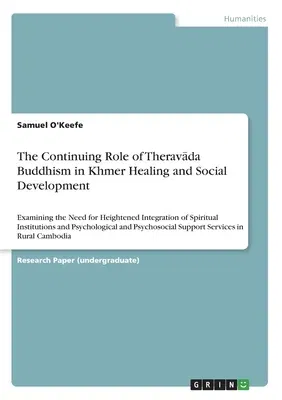Research Paper (undergraduate) from the year 2018 in the subject
Theology - Miscellaneous, grade: 90.00, course: Contemporary Cambodian
Studies, language: English, abstract: This study examines 1) the role
that Theravāda Buddhism plays today in Cambodian society and the precise
ideals and processes within the philosophy conducive to psychological
healing and larger social development, and 2) the cultural competencies
upheld by NGOs providing relief from trauma caused by the aforementioned
issues, paying specific attention to ways in which these NGOs do and do
not harness the healing powers and moral precepts of Theravāda Buddhism.
Research findings suggest the fruitfulness of Buddhist-oriented
approaches to psychological healing and social development in a country
exhibiting high rates of undiagnosed mental illness and low mental
health literacy in the rural provinces, which demonstrate the highest
mental health burden. A gradual yet targeted integration of Buddhist
spiritual personnel and institutions with psychological and psychosocial
support NGOs would be efficacious in enhancing the cultural competency
of NGOs' approaches while also extending the geographic reach of
counseling efforts and resources to the most marginalized in the
country. In Cambodia, trauma lingering from the Khmer Rouge era
genocide, combined with that produced by compounded social issues
including child sexual abuse, human trafficking, and gender-based
violence (GBV), contribute to one of highest rates in the world of what
a Western diagnostic model would define as PTSD. Such imbricated
realities in Cambodia remain stigmatized, taboo, and misunderstood
within Khmer society, oftentimes hindering the healing process for
survivors at the individual and community levels. NGOs analyzed in this
study seek to provide psychological and psychosocial support to those
experiencing trauma from these events, and concurrently promote
education on these issues. Considering the predominantly Western


